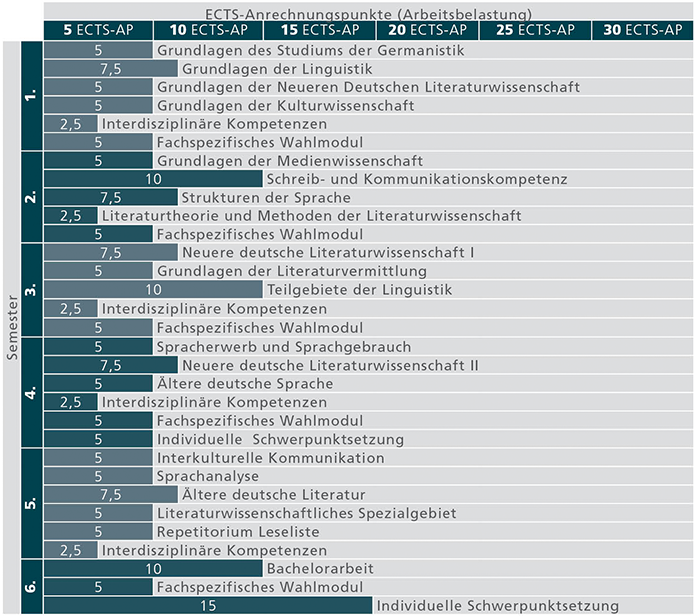Bachelorstudium Germanistik
Curriculum (2015W)
Bachelor of Arts
Dauer/ECTS-AP
6 Semester/180 ECTS-AP
Studienart
Vollzeit
Unterrichtssprache
Deutsch
Voraussetzung
Matura/Äquivalentes Zeugnis
Fakultät
Philologisch-Kulturwissenschaftliche Fakultät
Niveau der Qualifikation
Bachelor (1. Studienzyklus)
ISCED-11: Level 6, EQF/NQF: Level 6
ISCED-F
0232 Literatur und Linguistik
Studienkennzahl
UC 033 617
Zusatzprüfung
Die Zusatzprüfung aus Latein ist bis zur vollständigen Ablegung des Bachelorstudiums nachzuweisen, wenn dieses Fach nicht an einer höheren Schule im Ausmaß von mindestens 10 Wochenstunden erfolgreich absolviert wurde. Beachten Sie, dass diese Zusatzprüfung nicht die letzte Prüfung des Studiums sein darf.
Das Curriculum ist die Grundlage eines Studiums. Mit einem Blick auf das Curriculum zum Bachelor Germanistik erhältst du einen detaillierten Überblick zu Aufbau, Inhalt, Prüfungsordnung und Qualifikationsprofil dieses Bachelors.
Durch das Curriculum können mehrere wichtige Fragen bereits vor Studienbeginn geklärt werden. Zum Beispiel welche Kriterien für die Anmeldung zum Bachelor Germanistik erfüllt werden müssen, wie lange das Studium dauert, welche Module zu absolvieren sind und vieles mehr.
Für das Bachelorstudium Germanistik gilt aktuell das Curriculum 2015W.
Informationen zum Curriculum (2015W)
Die Gesamtfassung des Curriculums spiegelt das aktuell gültige Curriculum wider, ist rechtlich unverbindlich und dient lediglich der Information. Die rechtlich verbindliche Form des Curriculums inkl. etwaiger Änderungen finden Sie in den entsprechenden Mitteilungsblättern.
Die Information, welche Curriculumsversion für Sie gilt, entnehmen Sie bitte Ihrem Studienblatt
abrufbar unter: https://lfuonline.uibk.ac.at/public/lfuonline_meinestudien.studienblatt
Spalte: Curriculum in der geltenden Fassung
- Curriculum/Gesamtfassung (ab 01.10.2021)
- Mitteilungsblatt vom 27.05.2021, 73. Stück, Nr. 804 (Änderung des Curriculums)
- Curriculum/Gesamtfassung (ab 01.10.2016)
- Mitteilungsblatt vom 31.03.2016, 17. Stück, Nr. 294 (Änderung des Curriculums)
- Mitteilungsblatt vom 26.05.2015, 48 Stück, Nr. 431
Studieneingangs- und Orientierungsphase
(1) Im Rahmen der Studieneingangs- und Orientierungsphase, die im ersten Semester stattfindet, sind folgende Lehrveranstaltungsprüfungen abzulegen:
- SL Einführung in das Studium der Germanistik I: Neuere deutsche Literaturwissenschaft (PM1a/1 SSt/2,5 ECTS-AP),
- VO Einführung in das Studium der Germanistik II: Sprachwissenschaft (PM1b/1 SSt/2,5 ECTS- AP),
- VO Grundlagen der Kulturwissenschaft (PM8/2 SSt/5 ECTS-AP).
(2) Der positive Erfolg bei allen Prüfungen der Studieneingangs- und Orientierungsphase berechtigt zur Absolvierung der weiteren Lehrveranstaltungen und Prüfungen sowie zum Verfassen der Bachelorarbeit.
(3) Vor der vollständigen Absolvierung der Studieneingangs- und Orientierungsphase können Lehrveranstaltungen im Ausmaß von 20 ECTS-AP absolviert Im Curriculum festgelegte Anmeldungsvoraussetzungen sind einzuhalten.
(1) Die Studieneingangs- und Orientierungsphase umfasst ein Semester (30 ECTS-AP) und hat der oder dem Studierenden einen Überblick über die wesentlichen Inhalte des Studiums und dessen weiteren Verlauf zu vermitteln und eine sachliche Entscheidungsgrundlage für die persönliche Beurteilung ihrer oder seiner Studienwahl zu schaffen.
(2) Im Rahmen der Studieneingangs- und Orientierungsphase sind folgende Lehrveranstaltungsprüfungen, die zweimal wiederholt werden dürfen, abzulegen:
- SL Einführung in das Studium der Germanistik I: Neuere deutsche Literaturwissenschaft (2,5 ECTS-AP)
- VO Einführung in das Studium der Germanistik II: Sprachwissenschaft (2,5 ECTS-AP)
(3) Der positive Erfolg bei den in Abs. 2 genannten Prüfungen berechtigt zur Absolvierung aller weiteren, über die Studieneingangs- und Orientierungsphase hinausgehenden Lehrveranstaltungen und Prüfungen sowie zum Verfassen der im Curriculum vorgesehenen Bachelorarbeiten. Im Curriculum festgelegte Anmeldungsvoraussetzungen sind einzuhalten.
Empfohlener Studienverlauf
Der unten angeführte, exemplarische Studienverlauf gilt als Empfehlung für Vollzeitstudierende, die das Studium im Wintersemester beginnen. Die Aufstellung dient der Darstellung eines möglichen Studienablaufs und ist nicht verpflichtend. Etwaige Prüfungswiederholungen bzw. deren studienzeitverzögernde Wirkung sind nicht berücksichtigt.
Die Regelstudienzeit beträgt 6 Semester bzw. 180 ECTS-AP, wobei gemäß Universitätsgesetz die Arbeitsbelastung eines Studienjahres 1.500 (Echt-)Stunden zu betragen hat und dieser Arbeitsbelastung 60 Anrechnungspunkte zugeteilt werden (ein ECTS-Anrechnungspunkt entspricht einer Arbeitsbelastung der Studierenden von 25 Stunden).
5,0 ECTS-AP: Grundlagen des Studiums der Germanistik
7,5 ECTS-AP: Grundlagen der Linguistik
5,0 ECTS-AP: Grundlagen der Neueren Deutschen Literaturwissenschaft
5,0 ECTS-AP: Grundlagen der Kulturwissenschaft
2,5 ECTS-AP: Interdisziplinäre Kompetenzen
5,0 ECTS-AP: Fachspezifisches Wahlmodul
5,0 ECTS-AP: Grundlagen der Medienwissenschaft
10,0 ECTS-AP: Schreib- und Kommunikationskompetenz
7,5 ECTS-AP: Strukturen der Sprache
2,5 ECTS-AP: Literaturtheorie und Methoden der Literaturwissenschaft
5,0 ECTS-AP: Fachspezifisches Wahlmodul
7,5 ECTS-AP: Neuere deutsche Literaturwissenschaft I
5,0 ECTS-AP: Grundlagen der Literaturvermittlung
10,0 ECTS-AP: Teilgebiete der Linguistik
2,5 ECTS-AP: Interdisziplinäre Kompetenzen
5,0 ECTS-AP: Fachspezifisches Wahlmodul
5,0 ECTS-AP: Spracherwerb und Sprachgebrauch
7,5 ECTS-AP: Neuere deutsche Literaturwissenschaft II
5,0 ECTS-AP: Ältere deutsche Sprache
2,5 ECTS-AP: Interdisziplinäre Kompetenzen
5,0 ECTS-AP: Fachspezifisches Wahlmodul
5,0 ECTS-AP: Individuelle Schwerpunktsetzung
5,0 ECTS-AP: Interkulturelle Kommunikation
5,0 ECTS-AP: Sprachanalyse
7,5 ECTS-AP: Ältere deutsche Literatur
5,0 ECTS-AP: Literaturwissenschaftliches Spezialgebiet
5,0 ECTS-AP: Repetitorium Leseliste
2,5 ECTS-AP: Interdisziplinäre Kompetenzen
10,0 ECTS-AP: Bachelorarbeit
5,0 ECTS-AP: Fachspezifisches Wahlmodul
15,0 ECTS-AP: Individuelle Schwerpunktsetzung

| Semester | ECTS-AP | Titel |
|---|---|---|
Wahlpaket
Im Rahmen des Bachelorstudiums kann ein Wahlpaket im Umfang von 30 ECTS-AP absolviert werden.
Weiterführende Informationen bzw. eine Liste möglicher Wahlpakete sind abrufbar unter:
https://www.uibk.ac.at/studium/angebot/wahlpakete/
Erweiterung des Studiums
Im Rahmen dieses Studiums kann das Erweiterungsstudium Informatik im Umfang von 60 ECTS-AP absolviert werden. Die Zulassung zur Erweiterung setzt die Zulassung zu einem oder den bereits erfolgten Abschluss eines ausgewählten Studiums voraus. Weitere Informationen sind abrufbar unter: https://www.uibk.ac.at/studium/angebot/es-informatik/
Informationen zur Prüfungsordnung inkl. Bewertung und Benotung
Prüfungsordnung
Die Prüfungsordnung ist integraler Bestandteil des Curriculums, detaillierte Informationen finden Sie unter dem Paragrafen Prüfungsordnung.
Bei der Notenverteilungsskala handelt es sich um die statistische Darstellung der Verteilung aller positiv absolvierten Prüfungen, die innerhalb eines Studiums bzw. eines Studienfaches (unter Heranziehung aller gemeldeten Studierenden eines Studiums bzw. eines Studienfaches) erfasst wurden. Die Notenverteilungsskala wird in regelmäßigen Abständen aktualisiert.
| Österreichische Notenskala | Definition | %-Satz | ||
| 1 | SEHR GUT | 31,5 | = 100% | |
| 2 | GUT | 30,6 | ||
| 3 | BEFRIEDIGEND | 24,3 | ||
| 4 | GENÜGEND | 13,6 | ||
| 5 | NICHT GENÜGEND |
März 2025
Gesamtbeurteilung der Qualifikation
Nicht zutreffend
Erklärung: Eine Gesamtbeurteilung (mit Auszeichnung bestanden, bestanden, nicht bestanden) wird nur über eine studienabschließende Prüfung, die aus mehr als einem Fach besteht, vergeben (im Curriculum dieses Studiums ist diese nicht vorgesehen).
Kontakt und Information
Prüfungsreferat
Standort Innrain 52d
Studienbeauftragter (ab 01.03.2024)
Priv.-Doz. Mag. Dr. Peter Pohl
Studiendekanin (ab 01.03.2024)
Mag. Dr. Elisabeth De Felip-Jaud
